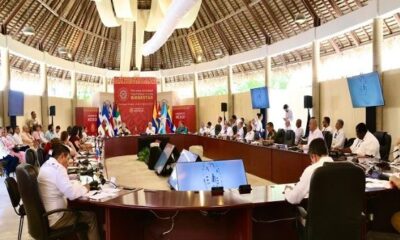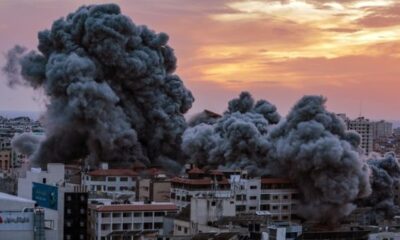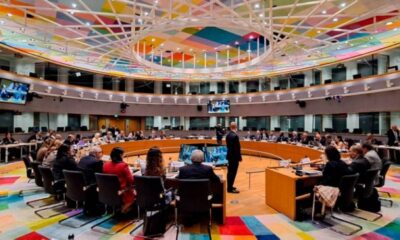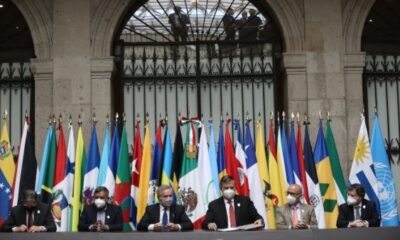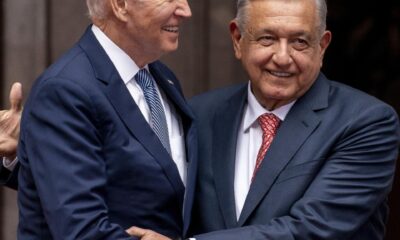International
Latin American leaders hold summit with Brazil back in the fold
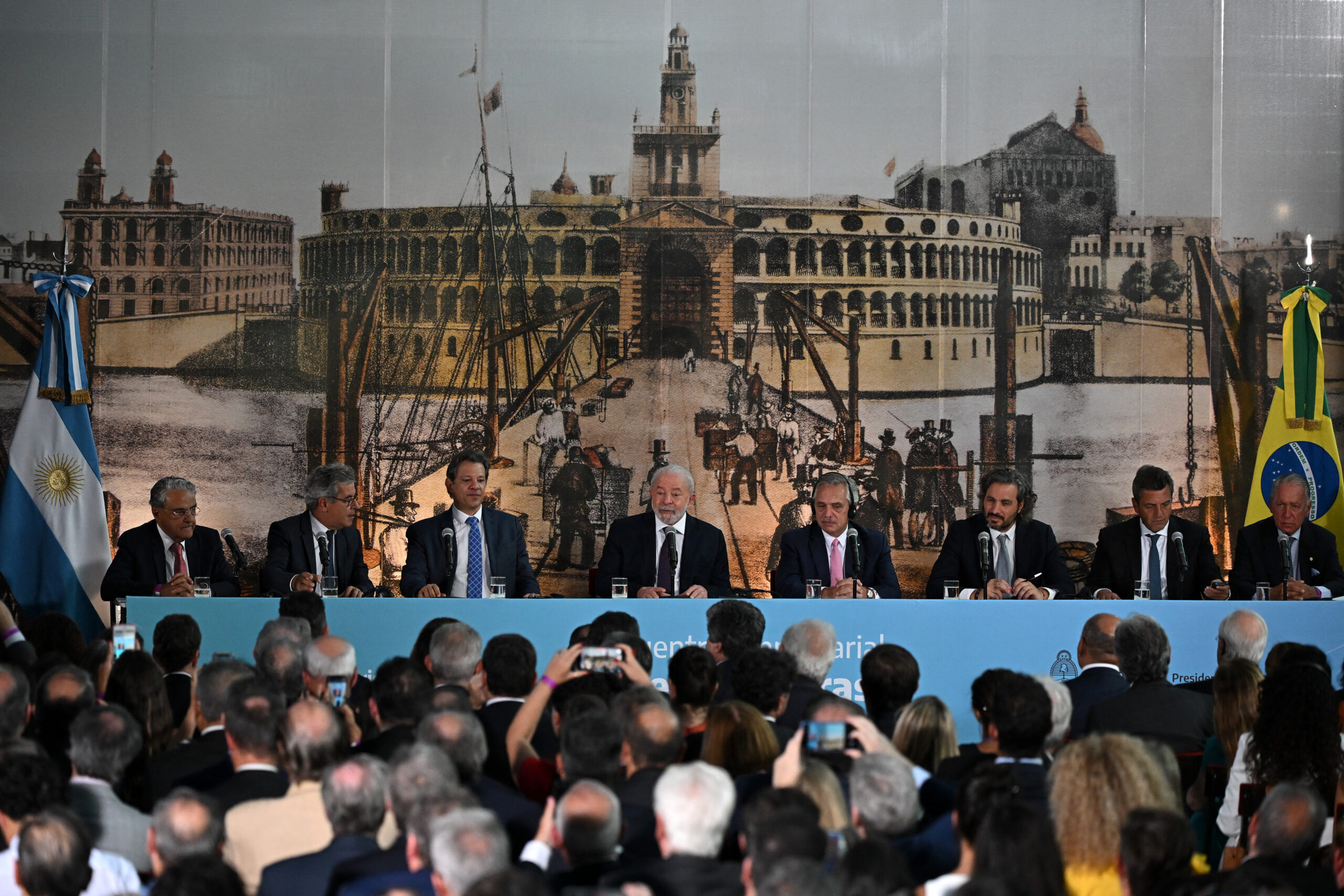
January 24 | By AFP | Philippe Bernes-Lasserre / Mauricio Rabuffetti |
Fifteen Latin American heads of state and government meet Tuesday in Buenos Aires for a regional summit welcoming back Brazil as President Luiz Inacio Lula da Silva looks to rebuild bridges after his far-right predecessor Jair Bolsonaro pulled out of the grouping.
The 77-year-old Lula, in Argentina for the first international trip of his third term, will participate in the seventh Community of Latin American and Caribbean States (CELAC) summit, bringing together 33 states from the region.
Lula was one of the founders of CELAC, during the first “pink wave” on the continent in the first decade of the century.
And now he brings Brazil back into the fold after Bolsonaro had suspended the country’s participation in the grouping.
Host Argentina this week hailed a “new climate in Latin America”, with the region ushering in a new wave of left or center-left governments since 2018, including Mexico, Argentina, Honduras, Chile, Colombia and Brazil.
A forum for consultation and cooperation, CELAC is not a regional integration mechanism with binding opinions.
And for all the importance underlined on Monday by Argentine President Alberto Fernandez and Lula of “the need to integrate Latin America,” CELAC is struggling to unite members over successive regional crises, like Peru.
“Latin America is bankrupt from the institutional point of view (…) it has not succeeded in integrating collectively into the world,” Ignacio Bartesaghi, an expert in international relations at the Catholic University of Uruguay, told AFP.
At the very least, CELAC “remains a vast and diverse space of Latin American countries from which minimal agendas or common interests for the region can be established”, agreed Bernabe Malacalza, researcher in international relations at the Argentine national research center CONICET.
“There is not even certain basic consensus in Latin America, as on the difference between a democracy and a dictatorship,” Bartesaghi stressed.
“There are (at CELAC) presidents who do not even recognize each other,” he noted.
Like Paraguay’s Mario Abdo Benitez, whose country broke diplomatic relations with Nicolas Maduro’s Venezuela in 2019.
Lula meanwhile has pledged to reopen the embassies.
‘Rebuild Mercosur!’
Maduro at last minute called off his trip, citing “a risk of aggression” from “the neo-fascist right,” a possible reference to some Argentine opposition politicians calling for him to be arrested on arrival.
Other significant absentees in Buenos Aires include Mexico’s leftwing President Andres Manuel Lopez Obrador, leader of the second largest economy in Latin America and host in 2021 of the last CELAC summit.
CELAC however remains the interlocutor of choice for China, or the EU to negotiate cooperation agendas with the region.
But even here, “The impossibility of holding an EU-CELAC summit since the last one in 2015 (in Brussels) illustrates (…), the absence of a solid biregional political dialogue,” Malacalza said.
In this sense, the return of Lula could give a boost to certain sub-regional issues, such as the free-trade agreement between the EU and the Mercosur group which comprises Brazil, Argentina, Uruguay and Paraguay.
The deal was finalized in 2019 but never ratified, due in particular to concerns about Bolsonaro’s environmental policy.
Lula has indicated a willingness to resume contacts.
“We are going to rebuild Mercosur!” Lula said Monday evening, referring to the customs union which has been torn in recent months over a free trade treaty with China.
“We will recreate Unasur!” he continued, referring to the moribund Union of South American Nations created in 2008 on the initiative of himself and Venezuela’s Hugo Chavez.
Latin America is only the initial phase of the Brazilian president’s international push, with Lula heading to Washington in February and to China “after March.”
International
Trump Floats “Friendly Takeover” of Cuba Amid Rising Tensions

U.S. President Donald Trump said Friday that his administration is considering what he described as a “friendly takeover” of Cuba, as Washington continues to increase pressure on the island’s communist government.
“The Cuban government is talking to us and they have very serious problems, as you know. They have no money, they have nothing at this moment, but they are talking to us and maybe we will see a friendly takeover of Cuba,” Trump told reporters as he departed the White House for a trip to Texas.
Earlier in the week, U.S. Secretary of State Marco Rubio said Cuba needed a “radical change,” shortly after Washington eased restrictions on oil exports to the island for what officials described as “humanitarian reasons,” amid a deep economic crisis.
The United States has imposed an energy blockade on Cuba since January, citing what it calls an “extraordinary threat” posed by the communist-run island, located roughly 150 kilometers (90 miles) off the coast of Florida, to U.S. national security.
International
Argentina’s Senate Reviews Milei-Backed Labor Overhaul

Argentina’s Senate on Friday began reviewing the Labor Modernization Law promoted by the administration of President Javier Milei, a proposal that would significantly reshape labor rules across the country.
The upper chamber opened its final discussion of the contentious initiative, which revises the method used to calculate severance payments — lowering the amounts owed in dismissal cases — and introduces an “hour bank” mechanism that allows overtime to be offset with paid leave rather than extra wages.
The legislation also broadens the classification of essential services, a change that would place new limits on the right to strike in designated sectors.
The bill was initially approved by the Senate on February 11 and then moved to the Chamber of Deputies, where lawmakers passed it with amendments. It has now returned to the Senate for definitive approval.
Outside the Congress building in Buenos Aires, workers, trade unions and left-wing organizations staged demonstrations beginning at midday. The gathering later thinned out amid reports of disturbances and a strong police presence. Security forces had secured the area surrounding the legislature since early morning hours.
Union leaders contend that the reform weakens labor protections, while many business representatives back the measure but stress that sustainable formal employment will require economic expansion, improved credit conditions, greater investment and a more dynamic domestic market.
International
Federal Judge Blocks Trump Policy Allowing Deportations to Third Countries

A federal judge ruled on Wednesday that the policy of U.S. President Donald Trump’s administration allowing immigration authorities to deport foreign nationals to third countries without prior notice or the opportunity to object is unlawful. The decision marks another legal setback for the administration on immigration matters.
Judge Brian Murphy of the U.S. District Court for the District of Massachusetts struck down the regulation issued last year, which stated that Immigration and Customs Enforcement (ICE) was not required to notify migrants if they were to be sent to countries other than the one listed in their removal order, provided that receiving nations offered assurances they would not face persecution or torture.
Murphy ordered the measure vacated but granted a 15-day delay before the ruling takes effect, giving the Trump administration time to file an appeal.
In his decision, the judge concluded that the policy violates federal immigration law and migrants’ due process rights. He also questioned the lack of transparency surrounding the alleged assurances provided by receiving countries, stating that “no one really knows anything about these supposed ‘assurances.’” He added, “It is not right, and it is not lawful.”
The ruling follows several legal disputes involving deportations to third countries. Last year, the executive branch deported more than 200 Salvadorans to a maximum-security prison in El Salvador, invoking an old wartime law. The White House also held talks with Costa Rica, Panama, and Rwanda about receiving migrants who are not citizens of those countries.
In May, the same judge determined that the government violated a court order when it attempted to remove a group of immigrants with criminal records to South Sudan without prior notice or an opportunity to raise claims of fear of persecution.
Although President Donald Trump took the case to the U.S. Supreme Court, which temporarily allowed the deportations to resume while a final decision was pending, the White House is expected to again appeal to higher courts to overturn this latest judicial ruling.
-

 International2 days ago
International2 days agoFamily of “El Mencho” Seeks Return of Body After Deadly Military Operation
-

 International2 days ago
International2 days agoLarry Summers Steps Down from Harvard Role Amid Epstein Controversy
-

 International2 days ago
International2 days agoIran’s President Optimistic Ahead of Geneva Nuclear Talks with U.S.
-

 International2 days ago
International2 days agoStephen Hawking Photo Appears in Newly Released Epstein Documents
-

 International2 days ago
International2 days agoBill Gates Admits “Serious Mistake” Over Epstein Ties
-

 International4 days ago
International4 days agoOver 40 Million Affected by Major Snowstorm in Northeastern U.S.
-

 International4 days ago
International4 days agoNine People Killed in Two Armed Attacks in Manabí, Ecuador
-

 International1 day ago
International1 day agoCocaine Production Surges 34% in 2023 as Market Expands into Africa and Asia
-

 International1 day ago
International1 day agoFederal Judge Blocks Trump Policy Allowing Deportations to Third Countries
-

 International1 day ago
International1 day agoClinton Accuses Republican Committee of Using Epstein Case to Shield Trump
-

 International14 minutes ago
International14 minutes agoArgentina’s Senate Reviews Milei-Backed Labor Overhaul
-

 International13 minutes ago
International13 minutes agoTrump Floats “Friendly Takeover” of Cuba Amid Rising Tensions



















































































